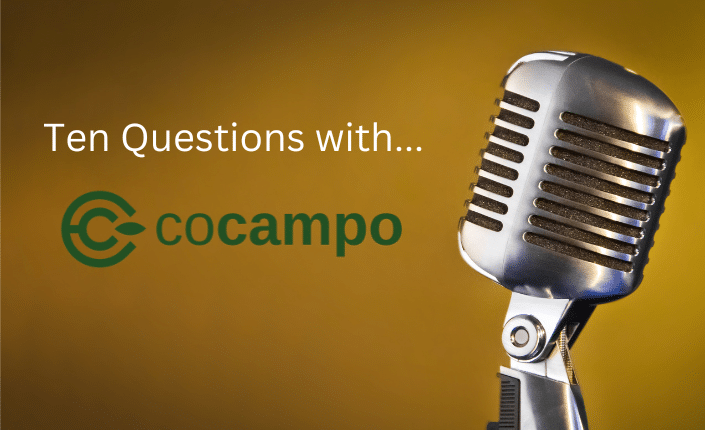
Agribusiness is a global industry worth US$ 3.2 Trillion in 2022 and is expected to reach a valuation of US$ 3.9 Trillion by 2028 (according to market research company IMARC Group).
Meanwhile, global and environmental crises overwhelm the planet, placing a higher-than-ever premium on unused and rural lands that are A) in desperate need of a new generation of serious investors and, B) the foundation upon which hugely profitable forests and farms are built.
But—what does the crossover between real estate and agriculture look like? Who is buying, and why? Why should we be talking about forests more?
We reached out to Regino Coca Barrionuevo to learn more about the industry and his rural real estate marketplace business CoCampo, where he is founder and CEO.
This is a profound and enduring relationship, one rooted in centuries of human history and marked by the intrinsic value of land as a finite and irreplaceable resource.
In the realm of real estate investments, unlike factories or commercial properties, land possesses a unique quality: it is immutable and finite.
In short, rural estates are not just land; they are the infrastructure for the agroalimentary industry, the foundation upon which the world's food supply is built.
Land ownership will include a few large corporations specializing in specific agricultural, livestock, and sustainability productions. They will consolidate land to create larger, more economically efficient operations ("food factories").
Forests, currently undervalued due to their lack of economic utility, will gain value for their contribution to planetary sustainability. Forest owners will receive income for absorbing the CO2 emissions generated by other entities.
Regarding land value, properties with the necessary characteristics to function as "food or sustainability factories"—or those with communication infrastructure and appeal to families as primary or secondary residences or recreational destinations—will experience a surge in their value.
Cocampo revolutionizes the rustic land market by offering a digital platform that streamlines and enhances the process of buying, selling, and leasing agricultural land, increasing transparency and accessibility for all parties involved.
On one side, we are the first global land platform. We have a competitive advantage just by building it.
Secondly, we are moving to Atlas, which will provide information about specific plots of land using a wide range of third-party data, meaning we can support and advise buyers of rural real estate from a data standpoint, too.
Cocampo is currently a classifieds business that is evolving through Cocampo Atlas to add a data business for the various markets comprising the agricultural economy.
Atlas includes data on rural properties (Proptech) as well as agricultural (Agtech), and sustainability and climate-related data (Climatetech or Cleantech).
Absolutely. In just two years of existence, we have obtained over €3Bn of rural properties listed for sale.
We collaborate with over 300 rural real estate agents and major real estate service providers and receive more than 40,000 monthly sessions on our Spanish website alone.
Furthermore, we have recently expanded our listing model to 40 countries, with ads already in four other markets (Portugal, France, Brazil and Argentina).
I financed the company when we launched in February 2022. We then raised €320,000 from business angels in December 2022.
In July 2023 we secured a €210,000 loan from the Spanish government, and we recently raised a further €400,000 from our initial partners (and some new ones).
This year, we hope to bring in specialized investors with experience in Marketplaces, Classifieds, Proptech, Agtech, or Climatech to establish ourselves as the unique global player in the land market.
We want to become the go-to online platform for the agrarian economy, as such a platform currently doesn't exist.
The plan is to monetize ads and sell bolt-on data services to support decision markers for investors in rural lands.
For now, our classified ads business model doesn't necessarily need to demonstrate revenue-generating capability—achieving high search engine rankings and volume is what truly matters, especially as we are just completing our second year in operation.
As for revenue, we introduced our first subscription plans for our CoCampo Atlas product in November 2023.
A frequent question we receive is why real estate portals are not successful with rural land. My response is that they never will be; the user experience is entirely different, and no portal has mastered this niche yet.
It's not impossible, it's just that rural buyers demand other factors. The agrarian economy is an industry with a business focus and unique characteristics that require its own space.
That's why we're here.
Honestly, our advantage is the lack of competition. In Spain, we have Milanuncios, but in other countries, there are no platforms like Cocampo; if any exist, they are generalists.
I would like to highlight three critical points that I believe hold significant importance:
One is the value of land as the most defensive and valuable asset in the face of recent and impending crises. Events such as wars, pandemics, and environmental sustainability make land a refuge for survival.
Two, the significance of forests, which have had limited value in terms of their use for timber exploitation or energy production. As environmental catastrophes intensify, we will increasingly compensate forest landowners. Consequently, we can expect large investors and funds to acquire these assets and become rentiers.
Finally, the growing importance of rural land as a means of wealth redistribution. Taking Spain as an example, 93% of rural landowners are individuals, and ownership is highly fragmented. While rising land prices are making it difficult for young individuals to enter agriculture and livestock farming, they are concurrently generating wealth for retiring farmers and ranchers who come from diverse geographical areas and socioeconomic backgrounds. This phenomenon is mirrored in other countries as well.